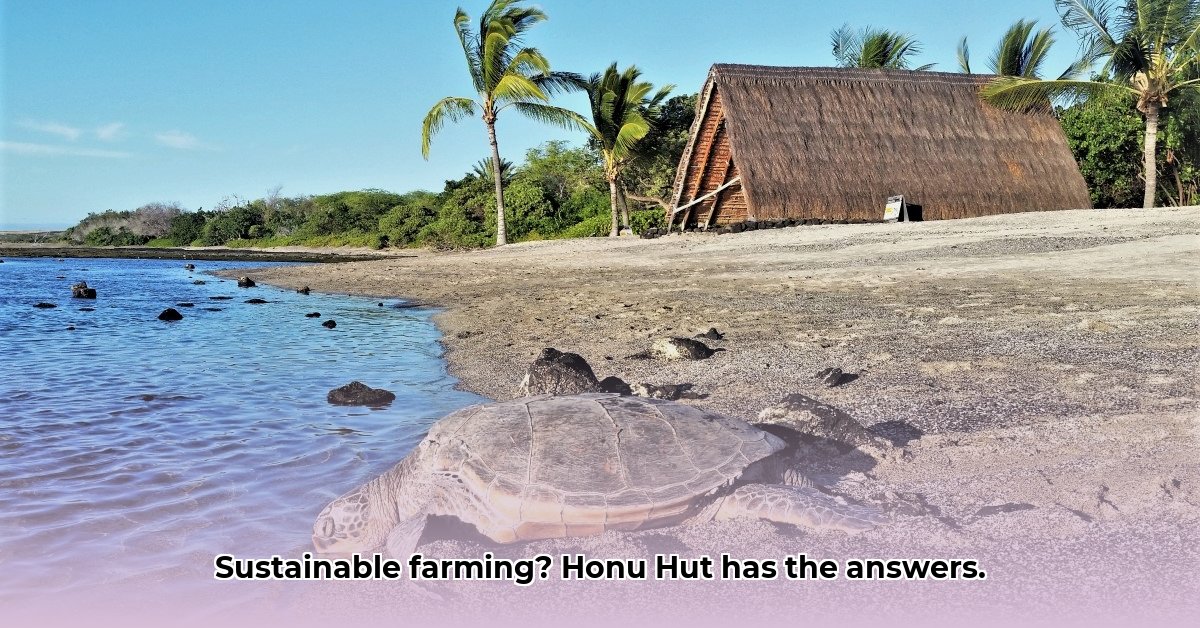
Honu Hut: A Vision of Sustainable Agriculture
Honu Hut—the name conjures images of a tranquil, productive haven. But what exactly is Honu Hut? While specifics remain elusive, available information suggests Honu Hut represents a pioneering approach to sustainable farming, prioritizing environmental stewardship and community engagement. This article explores the potential of Honu Hut and its contribution to a more sustainable future.
Understanding Honu Hut's Sustainable Practices
Imagine a farm where soil health is paramount, where the focus extends beyond profit to encompass the well-being of the planet and its communities. This encapsulates the essence of Honu Hut – a holistic approach to agriculture that prioritizes harmony with nature. It's about fostering a symbiotic relationship with the land, understanding its needs, and collaborating with natural processes rather than opposing them. Some might label it an agricultural revolution; others, a return to fundamental principles. Regardless, Honu Hut's approach is undeniably compelling.
Honu Hut's Innovative Growing Methods
Honu Hut likely employs several innovative techniques to achieve this delicate balance between productivity and sustainability:
Vertical Farming: Instead of sprawling fields, Honu Hut might utilize vertical farming (growing crops in stacked layers), maximizing yield per square foot and reducing land usage. This technique is particularly advantageous in urban settings or areas with limited space.
Precision Irrigation: Water conservation is crucial. Honu Hut is likely to incorporate precision irrigation techniques, such as drip irrigation, to deliver water directly to plant roots, significantly reducing water waste. Rainwater harvesting is another likely element, providing a reliable water source while minimizing reliance on external sources.
Composting and Soil Enrichment: Sustainable farming emphasizes recycling organic waste. Honu Hut would likely feature a robust composting system, transforming organic waste into nutrient-rich fertilizer. This improves soil health, reduces the need for chemical fertilizers, and promotes biodiversity.
Renewable Energy: Honu Hut probably leverages renewable energy like solar power to minimize reliance on fossil fuels and reduce its carbon footprint. This aligns with its commitment to environmental responsibility.
Community Engagement: Honu Hut likely fosters strong community ties. This could manifest as workshops on sustainable practices, participation in farmers' markets (providing fresh, locally-sourced produce), or collaboration with local organizations.
The Broader Impact of Honu Hut
The positive ripple effects of Honu Hut's approach transcend the farm itself:
Enhanced Food Security: Honu Hut likely improves local food security by maximizing yields and resource efficiency, ensuring access to fresh, healthy produce.
Improved Soil Health: Sustainable methods like composting and reduced chemical use promote healthier, more fertile soil, leading to long-term benefits.
Economic Growth: Honu Hut probably creates local jobs, boosting the economy and strengthening local food systems.
Biodiversity Preservation: Such farming methods tend to support biodiversity, protecting and supporting a diverse array of plant and animal life.
Challenges and Opportunities in Sustainable Agriculture
While Honu Hut's model is promising, it's crucial to acknowledge the challenges:
High Initial Investment: Sustainable farming techniques often require a substantial upfront investment in equipment and expertise.
Specialized Skillsets: Implementing these methods demands skilled labor and training.
Market Access: Connecting with consumers willing to pay a premium for sustainably produced goods is vital.
Despite these challenges, Honu Hut showcases a pathway to a more sustainable, equitable, and resilient food system. By blending innovation, community engagement, and environmental respect, Honu Hut and similar initiatives offer hope, paving the way for a greener future in food production. The journey is continuous, the hurdles are real, but the potential benefits are transformative. The future of responsible farming might well resemble Honu Hut.